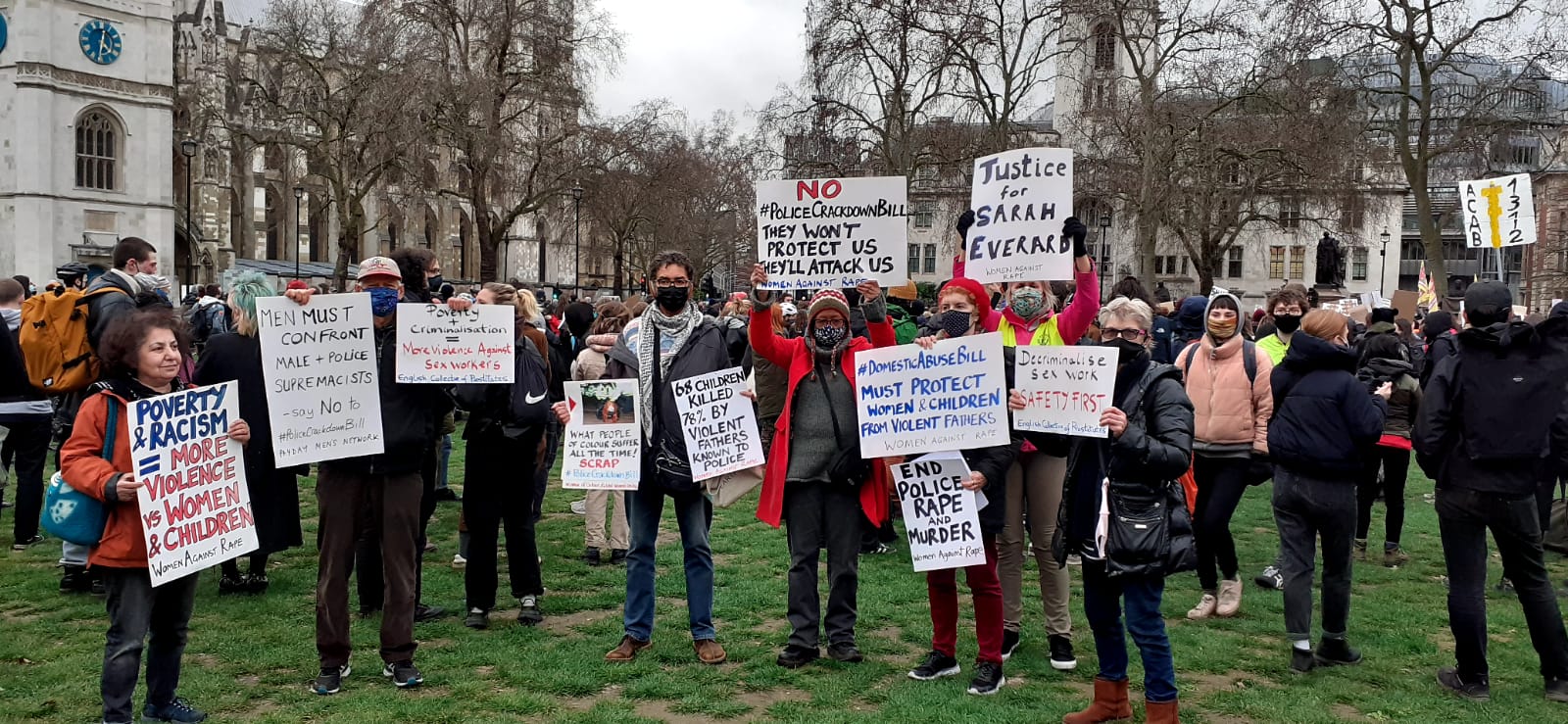Women Against Rape, protesting in Parliament Square - Credit: Women Against Rape
It was inevitably crowded in front of Scotland Yard on Mother’s Day as hundreds of women and men gathered to express their distress at the murder of Sarah Everard, and our outrage at the police response the night before on Clapham Common.
We weren’t the only ones there shocked but not surprised that the police had manhandled, handcuffed and arrested peaceful women paying their respects.
All week, thousands had taken to social media describing violence we had suffered. A policeman was charged with Sarah Everard’s murder, which added to our fury. Met chief Cressida Dick had said not to worry: such murders are rare!
The murder of Sarah Everard must be seen in context.
The virtual decriminalisation of rape: only 1.4% of reported rapes are prosecuted. Since the abolition of specialist Sapphire units and the digital strip searching of victims’ phones, rape has been downgraded even further by both police and Crown Prosecution Service.
Two women a week are murdered by a partner or ex-partner (three in some weeks under lockdown), usually after their reports of assaults and threats have gone unheeded by police. That’s 15 times more victims than are killed in “terror” incidents in the UK.
According to a UN Women UK survey released this month, 97% of women aged 18-24 had suffered sexual harassment; 96% had not reported it; half were convinced that nothing would be done.
Domestic abuse, including rape, is the most common form of violence, terrorising women daily but perpetrators can count on the criminal justice system to turn a blind eye. Mothers trying to protect their children and themselves from violent ex-partners face family courts which even the government Harm Review found to be “sexist, racist, and class ridden”.
Between 2004 and 2020, of 69 children killed by parents with a known history of violence, 91% were killed by fathers who were known to police and/or social services.
With Support Not Separation, Women Against Rape (WAR) has been campaigning to amend the Domestic Abuse Bill, now in parliament, to abolish the “presumption of contact” which forces children to visit and even live with violent fathers because it’s “good for them”. The government has refused. It has also refused to abolish the “no recourse to public funds” rule which bars victims with uncertain immigration status from accessing justice and services. How dare they deny any woman protection!
Those of us who are women of colour face not only sexism but also racism from the police, and made this clear at the Black Lives Matter protests. How else can we explain that when Nicole Smallman and Bibaa Henry were reported missing by their family, the police didn’t bother to look for them, and that after their bodies were found, again by family, officers circulated selfies with the bodies? Cressida Dick still denies the Met is institutionally racist.
86% of austerity cuts targeted women – including welfare benefits, social housing, legal aid and women’s refuges – all protections women need to stay safe and/or escape violence. Single mothers, women with disabilities and asylum seekers have been hardest hit.
The government has responded to the emergencies protesters have highlighted – violence against women and children, climate change, racism, the destruction caused by HS2 – with a bill increasing unaccountable police powers. The Police, Crime, Sentencing and Courts Bill, which many more have turned against since the Clapham Common events, is being rushed through Parliament. It would give police unprecedented powers to outlaw protests, including seizing phones, more stop and search, criminalise trespass (aimed at Gypsy, traveller and Roma communities, XR and others) and sentences of up to 10 years for damaging memorials.
This Police Bill follows the “Spy Cops” bill, which would give undercover agents a licence to rape and murder, and the Overseas Operations Bill, which would give military personnel impunity for crimes committed abroad.
The safety of women must be prioritised by the criminal justice system and economic policies that empower women so we can protect ourselves and our children. Women like Cressida Dick and Home Secretary Priti Patel do not speak for women. Their priority is greater police powers not our safety. They should both resign.
-
- Women Against Rape is a grassroots, multi-racial group, based in Kentish Town.


